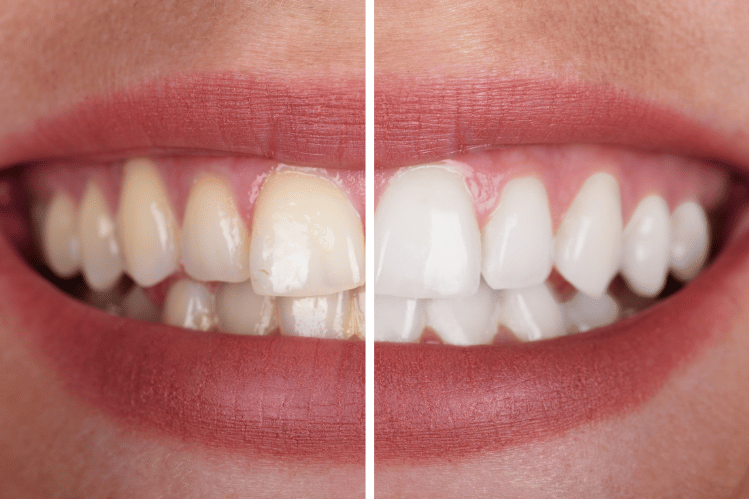
A bright, white smile is often associated with vitality and confidence. If you have stained or discolored teeth, you may be considering teeth whitening to enhance your smile. However, if you have dental fillings or crowns, it's essential to understand how teeth whitening treatments can affect them. In this blog post, we will explore the considerations and options for teeth whitening when you have stained fillings and crowns, providing you with the information you need to make informed decisions about achieving a whiter smile.
Understanding Stained Fillings and Crowns:
Dental fillings and crowns are commonly made from materials like composite resin or porcelain. Over time, these materials can become stained or discolored due to factors such as age, food and beverage consumption, and smoking. Unlike natural tooth enamel, fillings and crowns do not respond to traditional teeth whitening methods in the same way.
Teeth Whitening Options for Stained Fillings and Crowns:
It's important to note that teeth whitening treatments primarily target natural tooth enamel and may not significantly change the color of dental restorations. Here are a few options to consider:
Professional Teeth Whitening: Consult with your dentist to determine if professional teeth whitening is suitable for your specific case. They may recommend alternative treatments, such as using a whitening gel specifically designed for dental restorations or exploring other cosmetic options like veneers or crowns that match your desired tooth shade.
Replacement of Dental Restorations: If your fillings or crowns are significantly stained or no longer match your desired tooth shade, your dentist may recommend replacing them with new restorations that better match the whiteness of your natural teeth. This can be a more comprehensive approach to achieving a uniformly white smile.
Consultation with a Dental Professional
Before pursuing any teeth whitening treatment, it's crucial to consult with a dental professional. They will evaluate your specific situation, including the condition of your dental restorations, and provide personalized recommendations to achieve the best possible outcome for your smile.
Prevention and Maintenance
To minimize the risk of staining or discoloration on your dental restorations, it's important to practice good oral hygiene habits. Regular brushing, flossing, and professional dental cleanings can help prevent surface stains from developing. Additionally, avoiding or limiting the consumption of foods and beverages known to cause staining, such as coffee, tea, and red wine, can help maintain the whiteness of your natural teeth and dental restorations.
Communication with Your Dentist
Openly communicate your goals and concerns with your dentist. They are your best resource for guidance on teeth whitening options and can help develop a personalized treatment plan that considers the unique characteristics of your dental restorations.
Conclusion
Teeth whitening treatments can provide noticeable improvements to the color of your natural teeth, but the impact on stained fillings and crowns may be limited. It's essential to consult with a dental professional to determine the most suitable approach for achieving a whiter smile while considering the presence of dental restorations. By understanding the options available and maintaining open communication with your dentist, you can make informed decisions to enhance the overall appearance of your smile.
FAQs
Can teeth whitening treatments remove stains from dental fillings and crowns?
Teeth whitening treatments primarily target natural tooth enamel and may not significantly alter the color of dental restorations such as fillings and crowns. The materials used in these restorations do not respond to traditional teeth whitening methods in the same way as natural tooth enamel.
Will teeth whitening treatments damage my dental fillings or crowns?
Teeth whitening treatments, when used as directed, should not damage your existing dental restorations. However, it's important to consult with your dentist before undergoing any teeth whitening procedure to ensure that it is appropriate for your specific case and the condition of your dental restorations.
Are there any teeth whitening options specifically designed for dental restorations?
There are specialized whitening gels available that are designed specifically for dental restorations. These gels can be used to help match the color of your dental restorations with the whiteness of your natural teeth. Consult with your dentist to determine if this is a suitable option for you.
What are my options if my dental fillings or crowns are significantly stained and do not respond to teeth whitening?
If your dental fillings or crowns are severely stained or no longer match the desired shade of your natural teeth, your dentist may recommend replacing them with new restorations that better match the whiteness of your teeth. This can be a more effective way to achieve a uniformly white smile.
How can I prevent staining on my dental restorations?
Practicing good oral hygiene, including regular brushing, flossing, and professional dental cleanings, can help prevent surface stains from developing on your dental restorations. Additionally, avoiding or limiting the consumption of foods and beverages known to cause staining, such as coffee, tea, and red wine, can help maintain the whiteness of your natural teeth and dental restorations.

